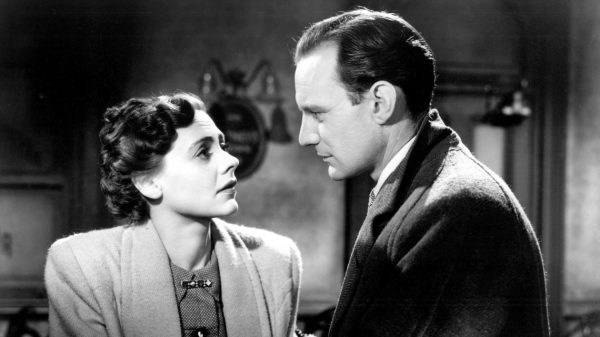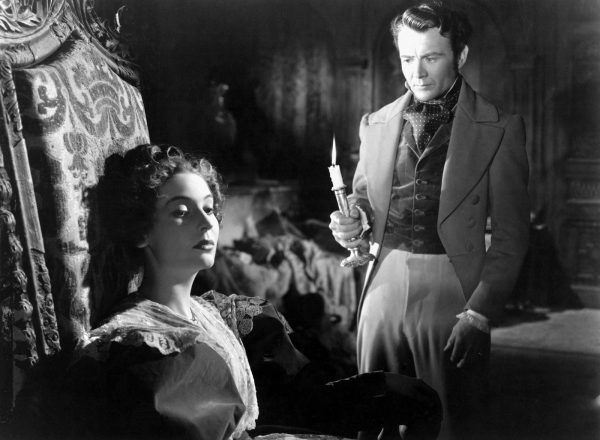by Neil Sinyard
Watch the ViewFinder BoB Playlist for this essay
"Home is where one starts from" – T.S.Eliot, ‘East Coker’
From his modest upbringing as an accountant’s son in a Quaker household in Croydon, and beginning his career in the film industry as tea-boy at Gaumont Studios, David Lean (1908-1991) developed into the most internationally acclaimed director of English cinema. He is responsible for epics such as The Bridge on the River Kwai (1957), Lawrence of Arabia (1962) and A Passage to India (1984), which are about as far removed from his suburban background (which he hated), in terms of location, as one could imagine.
And yet ‘Home’ is a key motif in Lean’s films. The word itself rings hollow at the end of Lawrence of Arabia and becomes a nebulous and elusive concept for Lean’s increasingly rootless central characters. Unlike Laura (Celia Johnson) in Brief Encounter (1945), who fantasises at one stage about faraway places while sitting in her Home Counties armchair, Lean’s later heroes and heroines will actually bestride the world but still carry a sense of home as part of their emotional baggage. There is a dual impact of their Englishness on their foreign environment and this environment on their Englishness. I want to consider four brief scenes from Lean’s work in which the idea of home is both prominent and problematic for the main character.
Immediately prior to the lead-in to the flashback in Brief Encounter, which forms the core of the narrative, we are given an almost archetypal impression of an English suburban home: young children asleep upstairs, wife in her armchair sewing, husband on the sofa doing the Times crossword puzzle. Laura has just helped him out with a clue, completing a line of poetry he cannot identify: the poet is Keats and the missing word, which she supplies, is “Romance”. For Fred (Cyril Raymond), it is “something… in seven letters” but it must be right, he says, because it fits in with “Delirium”. Romance often fits in with delirium in David Lean’s films.

Brief Encounter, 1945
Laura is listening to Rachmaninov’s Second Piano Concerto on the radio, arguably the most romantic concerto in the entire classical music repertoire; this, combined with her subjective narration, vividly illuminates the inner life of an outwardly monochrome heroine, who is recalling an unconsummated affair with a married doctor (Trevor Howard) with whom she has fallen in love. The passionate music that accompanies this ostensibly tranquil scene suggests an awareness that something vital is missing in her life. “We are a happily married couple,” she says in an internal monologue, “and must never forget that. This is my home…. This is my whole world and it’s enough, or rather, it was until a few weeks ago”.
What the film goes on to explore is the sense in which home, marriage and family is not enough. In her mind and in her memory (and possibly fantasy) this self-styled ‘ordinary’ woman will undergo a spiritual and psychological journey that will undermine her whole concept of home and lead to one of the great Expressionist moments in British cinema, as she starts coming adrift from her moral moorings and the camera tilts her towards a terrifying emotional abyss. If the hollowness of her way of life has been laid bare, what is there for her in the future? The power of the film lies in the way Lean has directed what might have seemed a drab suburban drama as if it were a dark subversive dream.
In Lean’s following film, Great Expectations, there is a similar ambivalence about ‘home’. Near the end of the film, after the death in prison of Pip’s benefactor Magwitch, Pip (John Mills) has a complete breakdown. He awakens from his delirium (which also fits in with romance, since his collapse is additionally associated with his unrequited love for Estella). There is an agonisingly prolonged fade-up before it reveals the face of the devoted Joe Gargery (Bernard Miles) watching over his bedside. “Joe, where am I?” he asks, to which Joe replies; “You’re home. I brought you home, dear old Pip, old chap.” “Oh Joe,” says Pip, “you break my heart.”
As is well known, Dickens wrote two endings for Great Expectations, one melancholy, one more hopeful. Lean only directed one ending to the film, but it could be interpreted in two different ways (one optimistic, the other more wish-fulfilment than reality); and it seems to me that this scene, in its preparation for the finale, can also be taken in two ways. Ostensibly, Pip wakes up slowly to find dependable Joe. When Joe tells him he has brought him home, Pip’s response – “Oh Joe, you break my heart” – is an acknowledgement of Joe’s kindness, even when Pip, as a gentleman, had become a snob and ashamed of his connection with him. But what if one regards the slow fade-up as suspenseful, reflecting Pip’s hope that the face he sees might be Estella? And when Joe tells him he has brought him home, what if Pip’s response reflects his sadness rather than his gratitude? After all he has been through, he is back where he started.

Great Expectations, 1946
It might be thought that interpreting Pip’s reaction as disappointment is doing some violence to its tone, yet what is intriguing is the expression Pip uses: “you break my heart”. Broken hearts are important in Great Expectations and synonymous with emotional agony. Breaking hearts is what the young Estella (Jean Simmons) has been trained to do. In Pip’s first encounter with Miss Havisham (Martita Hunt) as a young boy, she touches her heart and asks Pip if he knows what it is. “Your heart, Miss,” he replies. “Broken!” she cries, a woman who has become petrified in her home through romantic anguish. In both films, ‘home’ accretes complicated associations, oscillating between security and suffocation and throwing up questions about the main characters: who they are really, what they want, and where they truly belong.
Lean will dig further into the interlinked themes of home and romantic frustration in films between Great Expectations and River Kwai. For example, in The Passionate Friends (1949), he revisits the emotional landscape of Brief Encounter, dealing with a triangular love affair, but widens its physical horizons to include Europe, as if sensing that, in his x-ray of the morbid state of the English mind, he will need to explore vistas beyond those of England herself. That too will end with a suicidal wife (Ann Todd) rescued from throwing herself under a train by a stolid husband (Claude Rains), and an equivocal final conversation. “Shall we go home now?” says the husband. “Home?” she asks, in a tone of uncertainty. “If you want to…” he replies. In Summer Madness (1955), the romantic yearnings of a middle-aged woman (Katharine Hepburn) belong to the world of Brief Encounter, but unlike Laura, who just dreams of going to Venice, she actually goes, and her intoxication by the spirit of place looks ahead to the atmosphere of Lean’s later epic films, none of which will be set in England. Yet how far can these characters shake off their roots and find fulfilment or liberation?
In The Bridge on the River Kwai, after the bridge has been completed, Colonel Nicholson (Alec Guinness) is musing over what his life has been about, standing proudly on a construction which he sees as a monument to himself and to the indomitability of British prisoners of war acting heroically under duress, but which others might see as collaboration with the enemy. (Even as he speaks, a secret British demolition team is on its way to blow it up.) It is Nicholson’s most self-revealing speech, a personal reverie, but Lean films it obliquely, for the most part with Nicholson’s back to the camera. The inference is that the English way of dealing with or expressing powerful emotion is by stealth or indirection (like Laura’s internal monologue in Brief Encounter). Nicholson is the living embodiment of everything about the English that his Japanese captor, Colonel Saito (Sessue Hayakawa) hates: stubbornness without pride, arrogance even in defeat, doing everything by the book as if war were a game played according to rules of chivalry and even sportsmanship. (“English!” will become a term of exasperation and even an expletive in Lawrence of Arabia and A Passage to India.) Yet we learn that Nicolson has only spent ten months at home in the last twenty-eight years. Lean is fascinated by what happens to the English away from their natural habitat: whether they become disorientated or go native, or paradoxically, like Nicholson, become more exaggeratedly English than before.
In the final scene of Lawrence of Arabia, Lawrence (Peter O’Toole) is being driven home from the desert. “Well, sir, going home,” says the driver to him, but Lawrence does not seem to understand what has been said, so the driver repeats it: “Home, sir.” Yet Lawrence has stood up in the jeep to catch sight of an Arab tribe returning to their home, as if this is really where he would prefer to be and indeed who to be: an Englishman more at ease in Arab robes than in an Army uniform. He pays little attention to a British Army truck that passes, and the motorcyclist who overtakes them could even be a premonition of his death. We catch a brief blast of an Army song (“Goodbye Dolly, I must leave you, though it breaks my heart to go”), but it quickly fades and is displaced by a tentative, hollow-sounding reappearance of Maurice Jarre’s ‘Lawrence of Arabia’ theme, as if this is what Lawrence is actually hearing in his own head and which is his own inner music (as Rachmaninov is Laura’s). “Home, sir”? By now, Lawrence has no idea where home is.
In a 1985 edition of The South Bank Show devoted exclusively to his career, David Lean was asked what had first attracted him to the cinema. He replied: “I’d meet characters on the screen that I’d never meet in my ordinary dull suburban life.” He was determined to escape the suburbs and indeed lived the second half of his life without a home base. The critic Paul Rowan called him, “an international itinerant”, but added: “He enjoyed escaping the constraints of his Quaker upbringing, but he always remained with his shirt buttoned up to his neck (1).” Lean always denied any awareness on his part of a consistent theme running through his films. Nevertheless, he was regularly drawn to a certain kind of English ‘madness’, not only in characters like Colonel Nicholson and T.E. Lawrence (“This Oxford don on camelback. I mean, it was absolutely nutty”) (2), but even in an early comedy like Blithe Spirit (1945).

A Passage to India, 1984
In his final film, A Passage to India, what captures his imagination is not the anti-colonialist theme but the episode in the Marabar caves, where Adela’s English reserve cracks open under the twin pressure of fear and desire, leading to hallucination and hysteria. Unlike E.M. Forster in the novel, Lean begins his film in a rainy, overcast England, as if you need that context in order to understand her later behaviour. Like Laura in Brief Encounter, Adela (Judy Davis) is a character to whom externally ‘nothing happened’, but to whom everything has happened in the dark cave of her repressed imagination. For all his globe-trotting, Lean could never shed his English skin, which might be the reason that no one caught so memorably and majestically the erratic, erotic emotions that lurked beneath prim, grim English passion and propriety.
(1) Paul Benedict Rowan, Making Ryan’s Daughter, New Island Books, 2020, p.24.
(2) George Stevens Jr. (ed) The Great Moviemakers of Hollywood’s Golden Age, Vintage Books, 2007,p.432.
About the Author
Neil Sinyard is Emeritus Professor of Film Studies at Hull University, a Department he founded and of which he was Head until his retirement. He has published more than 25 books and over 100 articles on film, specialising particularly in British and Hollywood cinema, director monographs, film adaptations of literature, and representations of childhood on film. His most recent book: George Stevens: The Films of a Hollywood Giant was published by McFarland & Co in 2019. He has also contributed to over 50 DVD and Blu-ray releases as writer and commentator. He is co-editor of the British Film Makers series of monographs for Manchester University Press and Literary Editor of the Graham Greene quarterly newsletter.